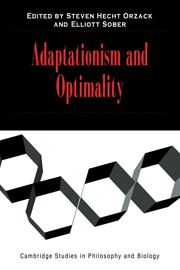Book contents
- Frontmatter
- Contents
- Contributors
- Acknowledgments
- Introduction
- 1 A Likelihood Framework for the Phylogenetic Analysis of Adaptation
- 2 Adaptation, Phylogenetic Inertia, and the Method of Controlled Comparisons
- 3 Optimality and Phylogeny: A Critique of Current Thought
- 4 Fit of Form and Function, Diversity of Life, and Procession of Life as an Evolutionary Game
- 5 Optimality and Evolutionary Stability under Short-Term and Long-Term Selection
- 6 Selective Regime and Fig Wasp Sex Ratios: Toward Sorting Rigor from Pseudo-Rigor in Tests of Adaptation
- 7 Is Optimality Over the Hill? The Fitness Landscapes of Idealized Organisms
- 8 Adaptation, Optimality, and the Meaning of Phenotypic Variation in Natural Populations
- 9 Adaptationism, Optimality Models, and Tests of Adaptive Scenarios
- 10 Adaptation and Development: On the Lack of Common Ground
- 11 Three Kinds of Adaptationism
- 12 Adaptation, Adaptationism, and Optimality
- Index
11 - Three Kinds of Adaptationism
Published online by Cambridge University Press: 06 January 2010
- Frontmatter
- Contents
- Contributors
- Acknowledgments
- Introduction
- 1 A Likelihood Framework for the Phylogenetic Analysis of Adaptation
- 2 Adaptation, Phylogenetic Inertia, and the Method of Controlled Comparisons
- 3 Optimality and Phylogeny: A Critique of Current Thought
- 4 Fit of Form and Function, Diversity of Life, and Procession of Life as an Evolutionary Game
- 5 Optimality and Evolutionary Stability under Short-Term and Long-Term Selection
- 6 Selective Regime and Fig Wasp Sex Ratios: Toward Sorting Rigor from Pseudo-Rigor in Tests of Adaptation
- 7 Is Optimality Over the Hill? The Fitness Landscapes of Idealized Organisms
- 8 Adaptation, Optimality, and the Meaning of Phenotypic Variation in Natural Populations
- 9 Adaptationism, Optimality Models, and Tests of Adaptive Scenarios
- 10 Adaptation and Development: On the Lack of Common Ground
- 11 Three Kinds of Adaptationism
- 12 Adaptation, Adaptationism, and Optimality
- Index
Summary
Debate about adaptationism in biology continues, in part because within “the” problem of assessing adaptationism, three distinct problems are mixed together. The three problems concern the assessment of three distinct adaptationist positions, each of which asserts the central importance of adaptation and natural selection to the study of evolution but conceives this importance in a different way. As there are three kinds of adaptationism, there are three distinct “antiadaptationist” positions as well. Or putting it more formally, there are three different dimensions here, and strongly adaptationist views, strongly antiadaptationist views, and moderate views are possible for each dimension.
Understanding the distinctions between the three adaptationist positions will not remove all controversy, but some progress can be made through clarifying the distinctions. In particular, progress can be made by recognizing that evidence against one kind of adaptationism need not also be evidence against other kinds. So the main aims of this chapter are classification and clarification. I describe the three kinds of adaptationism and then discuss the evidence relevant to each one. In particular, I try to say which problems might be solved directly through empirical research, and which are more philosophical in character.
A STATEMENT OF THE DISTINCTIONS
Here are the three kinds of adaptationism I recognize: empirical adaptationism, explanatory adaptationism, and methodological adaptationism.
Empirical Adaptationism: Natural selection is a powerful and ubiquitous force, and there are few constraints, except general and obvious ones, on the biological variation that fuels it. To a large degree, it is possible to predict and explain the outcome of evolutionary processes by attending only to the role played by selection. No other evolutionary factor has this degree of causal importance.
- Type
- Chapter
- Information
- Adaptationism and Optimality , pp. 335 - 357Publisher: Cambridge University PressPrint publication year: 2001
- 99
- Cited by



